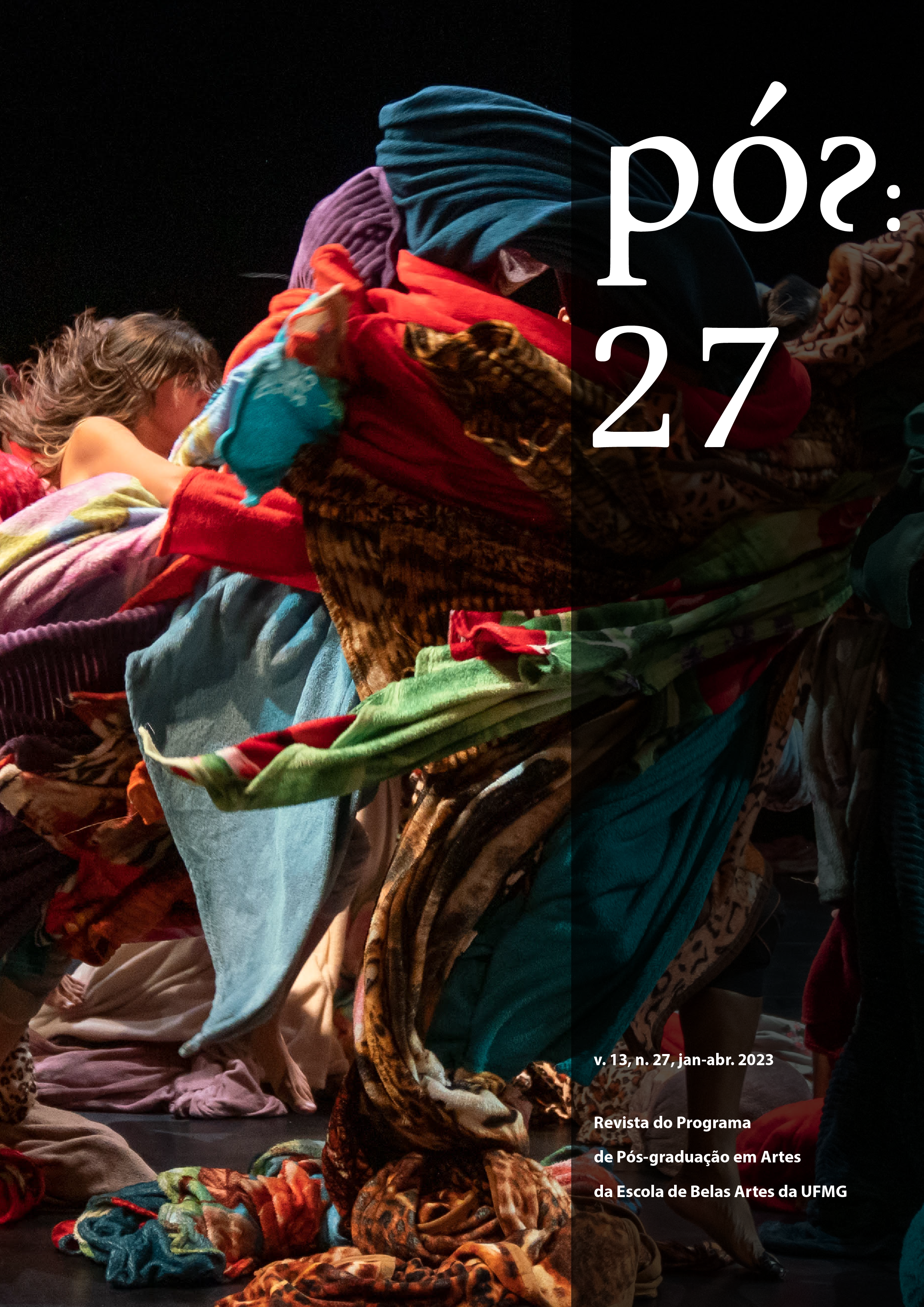Por uma (Est)Ética da monstruosidade Queer
Uma análise indisciplinada sobre o filme “Todos estão falando sobre o Jamie”
DOI:
https://doi.org/10.35699/2237-5864.2023.41679Palavras-chave:
Cinema., Arte Queer., Teoria Queer, (Est)Ética da ExistênciaResumo
No presente ensaio, tomando como lócus de análise o filme “Todos estão falando sobre o Jamie” (Everybody’s Talking About Jamie) e inspiradas pelas autoras e autores do Pós-Estruturalismo, da teoria Queer e do Transfeminismo, nos propomos pensar e problematizar qual o lugar das normatividades na experiência escolar e de vida das pessoas que experimentam a condição de dissidência sexual e/ou de gênero. Aqui a imagem fílmica é compreendida como um artefato cultural, ou seja, como um constructo sócio-histórico cuja inteligibilidade produz não apenas sentidos mas deseja impor modelos. Em nossa tessitura, o personagem principal Jamie e suas vivências no interior da escola, e para além dela, emergem como um índice de contestação e resistência contra as normatividades. Acreditamos que a existência e a arte Queer materializada no personagem principal da trama atestam uma micropolítica da (re)existência que, apesar de toda parafernália normativa, institui-se como uma (est)ética da existência Queer radical face aos regimes de verdades alicerçados na heterossexualidade compulsória e no binarismo de gênero.
Referências
ADAD, Shara Jane Holanda Costa; NASCIMENTO, Letícia Carolina Pereira do; MARTINS, Lucivando Ribeiro. Aprendizagem na educação e as diferenças – resistência ao heteroterrorismo cultural: que só os beijos te tapem a boca. Pesquisa, Sociedade e Desenvolvimento, Vargem Grande Paulista, v. 9, n. 8, p. 1-24, 2020. Disponível em: https://rsdjournal.org/index.php/rsd/article/view/5928 Acesso em: 13 fev. 2022.
ANZALDUA, Gloria. Como domar uma língua selvagem. Cadernos de Letras da UFF – Dossiê: Difusão da língua portuguesa, Niterói, n. 39, p. 297-309, 2009. Disponível em: https://www.yumpu.com/pt/document/view/12544587/como-domar-uma-lingua-selvagem-gloria-anzaldua-uff Acesso em: 13 fev. 2022.
BALESTRIN, Patrícia Abel. Gênero e sexualidade no cinema: questões para a educação. In: XAVIER FILHA, Constantina (org.). Educação para a sexualidade, equidade de gênero e para a diversidade sexual. Campo Grande: UFMS, 2009.
BENTO, Berenice. Apresentação. In: LEITE JR, Jorge. Nossos corpos também mudam: A invenção das categorias “travesti” e “transexual” no discurso científico. São Paulo: Annablume/FAPESP, 2011. p. 15-23.
BERGALA, Alain. A hipótese-cinema. Rio de Janeiro: Booklink; CINEAD-LISE-FE/UFRJ, 2008.
BIEHL, João. Antropologia do devir: psicofármacos – abandono social – desejo. Revista de Antropologia, São Paulo, v. 51, n. 2, p. 413-449, 2008. Disponível em: https://www.revistas.usp.br/ra/article/view/27285 Acesso em: 13 fev. 2022.
BUTLER, Judith. Quadros de guerra: Quando a vida é passível de luto? Rio de Janeiro: Civilização Brasileira, 2015.
BUTLER, Judith. Problemas de Gênero: feminismo e subversão da identidade. Rio de Janeiro: Civilização Brasileira, 2003.
CAETANO, Marcio et al. “A ferro e fogo”: questionamentos à linguagem e aos corpos educados. In: Lorena Lima de Moraes; Larissa de Pinho Cavalcanti. (Orgs). Deslocamentos e Permanências: trabalho, educação e interseccionalidades. Campinas/SP: Pontes Editores, 2022. p. 223-241.
CANDAU, Vera Maria. Multiculturalismo e educação: desafios para a prática pedagógica. In: MOREIRA, Antônio Flávio; CANDAU. Vera Maria. Multiculturalismo: diferenças culturais e práticas pedagógicas. Petrópolis: Vozes, 2008. p. 13-37.
COLLINS, Patricia Hill. Pensamento feminista negro: o poder da autodefinição. In: HOLLANDA, Heloisa Buarque de. Pensamento feminista: conceitos fundamentais. Rio de Janeiro: Bazar do Tempo, 2019. p. 271-310.
CORNEJO, Giancarlo. Por uma pedagogia Queer da amizade. Áskesis, São Carlos, v.4, n.1, 2015. p. 130-142. Disponível em: http://www.revistaaskesis.ufscar.br/index.php/askesis/article/view/47 Acesso em: 28 out. 2022.
HALBERSTAM, Jack. A arte Queer do fracasso. Recife: Cepe, 2020.
LANZ, Letícia. O corpo da roupa: a pessoa transgênera entre a conformidade e a transgressão das normas de gênero. Uma introdução aos estudos transgêneros. 2. ed. Curitiba: Movimento Transgente, 2017.
LEITE JR, Jorge. Nossos corpos também mudam: a invenção das categorias “travesti” e “transexual” no discurso científico. São Paulo: Annablume/FAPESP, 2011.
LOURO, Guacira Lopes. Um corpo estranho: ensaios sobre sexualidade e teoria Queer. Belo Horizonte: Autêntica, 2008.
MOMBAÇA, Jota. Não vão nos matar agora. Rio de Janeiro: Cobogó, 2021.
NASCIMENTO, Letícia Carolina Pereira do. Transfeminismo. São Paulo: Editora Jandaíra, 2021a.
NASCIMENTO, Letícia Carolina Pereira do. Monstra-Florescer: feminilizando práticas educativas. In: ADAD, Shara Jane Holanda; LIMA, Joana D’Arc de Sousa; BRITO, Antônia Edna. (org.). Práticas educativas: múltiplas experiências em educação. Fortaleza, CE: EdUECE, 2021b. p. 286-306.
OLIVEIRA, Esmael Alves de; DUQUE, Tiago. Algumas reflexões indisciplinadas sobre “Diversidade”, Diferença e “Inclusão”. In: ALMEIDA, Denise Mesquita de Melo; ZANON, Regina Basso; FEITOSA, Lígia Cavalcante; ANACHE, Alexandra Ayache (org.). Psicologia, Educação e Trabalho: inclusão em diferentes contextos. Curitiba: CRV, 2021. v. 1. p. 109-118.
OLIVEIRA, Esmael Alves de; MARTINS, Catia Paranhos; NASCIMENTO, Letícia Carolina do. “Laerte-se” e Tomboy: convites às experimentações de si. Revista Ambivalências, v. 7, n. 13, p. 109-126, 2019. Disponível em: https://seer.ufs.br/index.php/Ambivalencias/article/view/11289 Acesso em: 13 fev. 2022.
PRECIADO, Paul B. Quem defende a criança queer? In: PRECIADO, Paul B. Um apartamento em Urano: Crônicas da travessia. Rio de Janeiro: Zahar, 2020a. p. 69-73.
PRECIADO, Paul. Eu sou o monstro que vos fala. Tradução Sara York. Revista Palavra Solta, 2020b. Disponível em: https://www.revistaapalavrasolta.com/post/eu-sou-o-monstro-que-vos-fala Acesso em: 13 fev. 2022.
PRECIADO, Paul B. Carta de um homem trans ao antigo regime sexual. In: PRECIADO, Paul B. Um apartamento em Urano: Crônicas da travessia. Rio de Janeiro: Zahar, 2020c. p. 312-317.
PRECIADO, Paul B. Um apartamento em Urano: Crônicas da travessia. Rio de Janeiro: Zahar, 2020d.
PRECIADO, Paul. Multidões queer: notas para uma política dos “anormais”. Revista Estudos Feministas, Florianópolis, v. 19, n. 1, p. 11-20, 2011. Disponível em: https://www.scielo.br/j/ref/a/yvLQcj4mxkL9kr9RMhxHdwk/ Acesso em: 13 fev. 2022.
ROSEIRO, Steferson Zanoni; RODRIGUES, Alexsandro; CAETANO, Marcio. “Era uma vez nenhuma” ou os descabidos contos de fadas de uma professora sem modos e uma criança desbocada. REBEH – Revista Brasileira de Estudos da Homocultura, Cuiabá, v. 4, n. 13, p. 33-55, 2021. https://periodicoscientificos.ufmt.br/ojs/index.php/rebeh/article/view/11327 Acesso em: 13 fev. 2022.
VERGUEIRO, Viviane. Por inflexões decoloniais de corpos e identidades de gênero inconformes: uma análise autoetnográfica da cisgeneridade como normatividade. Orientador: Djalma Thürler. 2015. 244f. Dissertação (Mestrado em Cultura e Sociedade) – Instituto de Humanidades, Artes e Ciências Professor Milton Santos, Universidade Federal da Bahia, Salvador, 2015.
XAVIER FILHA, Constantina. Luz, câmera, ação… Problematizando sexualidades, gênero e infâncias no cinema: desejo de ‘desver’ o mundo. In: XAVIER FILHA, Constantina (org.). Sexualidades, gênero e infâncias no cinema. Campo Grande: UFMS, 2014. p. 9-14.
Downloads
Publicado
Edição
Seção
Licença
Copyright (c) 2023 Esmael Alves de Oliveira, Sra. Letícia Nascimento

Este trabalho está licenciado sob uma licença Creative Commons Attribution-NonCommercial 4.0 International License.
Autores que publicam nesta revista concordam com os seguintes termos:
- Autores mantém os direitos autorais e concedem à revista o direito de primeira publicação, com o trabalho simultaneamente licenciado sob a Creative Commons Attribution-NonCommercial 4.0 International License que permite o compartilhamento do trabalho com reconhecimento da autoria e publicação inicial nesta revista.
- Autores têm autorização para assumir contratos adicionais separadamente, para distribuição não-exclusiva da versão do trabalho publicada nesta revista (ex.: publicar em repositório institucional ou como capítulo de livro), com reconhecimento de autoria e publicação inicial nesta revista.
- Autores têm permissão e são estimulados a publicar e distribuir seu trabalho online (ex.: em repositórios institucionais ou na sua página pessoal) a qualquer ponto antes ou durante o processo editorial, já que isso pode gerar alterações produtivas, bem como aumentar o impacto e a citação do trabalho publicado
- É responsabilidade dos autores a obtenção da permissão por escrito para usar em seus artigos materiais protegidos por lei de Direitos Autorais. A Revista PÓS não é responsável por quebras de direitos autorais feitas por seus colaboradores.












